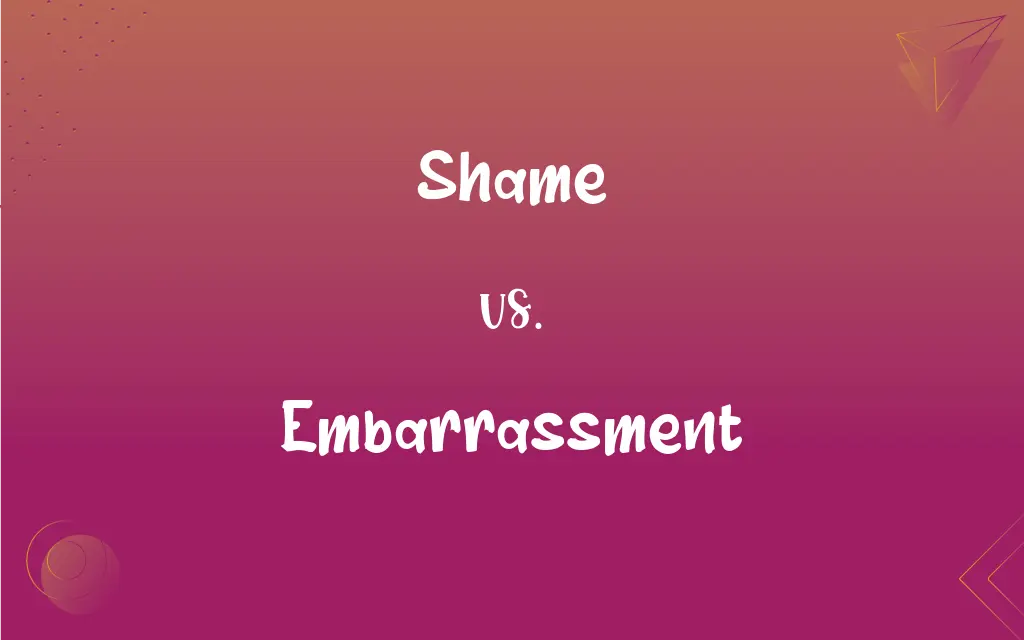Shame vs. Embarrassment: What's the Difference?
Edited by Aimie Carlson || By Janet White || Published on December 23, 2023
Shame is a deep feeling of guilt or unworthiness. Embarrassment is a feeling of self-consciousness or awkwardness.

Key Differences
Shame is a profound emotional response related to one's sense of self, often tied to guilt, unworthiness, or disgrace. Embarrassment is a more surface-level emotion, typically arising from awkward social situations or mistakes.
Shame often involves a negative evaluation of one's character or identity, possibly leading to lasting emotional impact. Embarrassment, however, is usually about a specific incident or action and is typically short-lived.
The feeling of shame can be internal and private, not necessarily known or observed by others. Embarrassment is often experienced in social contexts, triggered by perceived social judgment or faux pas.
Shame is often associated with deeper psychological effects and can contribute to feelings of low self-esteem or depression. Embarrassment is generally less severe, causing temporary discomfort or social awkwardness.
The triggers for shame are often personal moral failings or deep-seated issues, whereas embarrassment can be caused by simple social blunders or misunderstandings.
ADVERTISEMENT
Comparison Chart
Emotional Depth
Deep and profound
Surface-level and temporary
Focus
Self-identity and moral standing
Social situations and interactions
Duration
Potentially long-lasting
Typically short-lived
Psychological Impact
More serious, affecting self-esteem
Generally less serious, causing discomfort
Trigger
Personal failings, moral lapses
Social blunders, awkward situations
ADVERTISEMENT
Shame and Embarrassment Definitions
Shame
A person, action, or situation that brings a loss of respect or honor.
The scandal was a shame to the community.
Embarrassment
A person or thing causing embarrassment.
The broken zipper was an embarrassment during the presentation.
Shame
A painful feeling of humiliation or distress caused by consciousness of wrong or foolish behavior.
She felt shame for lying to her friend.
Embarrassment
A situation or state of being that causes embarrassment.
The mix-up at the office was a huge embarrassment.
Shame
The condition of being disgraced or guilty.
He carried the shame of the mistake with him.
Embarrassment
A feeling of self-consciousness, shame, or awkwardness.
He felt embarrassment when he forgot his lines on stage.
Shame
A regrettable or unfortunate situation or action.
It was a shame that the event was canceled.
Embarrassment
The act or condition of being embarrassed.
Her embarrassment was evident when she tripped.
Shame
A loss of respect or esteem; dishonor.
His actions brought shame to his family.
Embarrassment
The state of being awkwardly exposed to ridicule or shame.
The misunderstanding caused her great embarrassment.
Shame
A painful emotion caused by the belief that one is, or is perceived by others to be, inferior or unworthy of affection or respect because of one's actions, thoughts, circumstances, or experiences
Felt shame for having dropped out of school.
Embarrassment
The act or an instance of embarrassing
His embarrassment of the guests ended the party.
FAQs
Is embarrassment always public?
Often, but one can feel embarrassed even in private situations.
What is embarrassment?
Embarrassment is a feeling of self-consciousness or awkwardness.
Can shame be private?
Yes, shame can be a deeply internal and private emotion.
What is shame?
Shame is a deep feeling of guilt or unworthiness.
Is it possible to overcome shame?
Yes, through self-reflection, forgiveness, and therapy, one can overcome shame.
Does shame affect self-esteem?
Yes, shame can negatively impact one's self-esteem.
Does culture affect what causes shame?
Yes, cultural norms and values can greatly influence what is considered shameful.
How long does embarrassment last?
Embarrassment is typically a short-lived emotion.
What causes shame?
Shame can be caused by actions that one perceives as morally wrong or degrading to one's character.
What triggers embarrassment?
Social gaffes, mistakes, or awkward situations often trigger embarrassment.
Is embarrassment related to social norms?
Yes, it often arises from violating or not meeting social norms.
What is the relationship between shame and guilt?
Shame is about how we feel about ourselves, while guilt is about our actions.
Does age affect sensitivity to shame?
Sensitivity to shame can change with age and personal development.
Does embarrassment have to involve others?
Not necessarily, one can feel embarrassed even in solitary situations.
Can shame lead to other mental health issues?
Yes, persistent shame can contribute to issues like depression and anxiety.
Can shame be a motivator for change?
Yes, it can motivate individuals to change behavior or improve themselves.
Can embarrassment be humorous?
Sometimes, embarrassment can be seen as humorous, especially in retrospect.
How do people react to embarrassment?
Reactions vary, including blushing, laughter, or trying to hide the situation.
Do children experience embarrassment?
Yes, children can experience embarrassment, often as they learn social norms.
Can embarrassment be positive?
In some cases, it can be a learning experience or lead to personal growth.
About Author
Written by
Janet WhiteJanet White has been an esteemed writer and blogger for Difference Wiki. Holding a Master's degree in Science and Medical Journalism from the prestigious Boston University, she has consistently demonstrated her expertise and passion for her field. When she's not immersed in her work, Janet relishes her time exercising, delving into a good book, and cherishing moments with friends and family.
Edited by
Aimie CarlsonAimie Carlson, holding a master's degree in English literature, is a fervent English language enthusiast. She lends her writing talents to Difference Wiki, a prominent website that specializes in comparisons, offering readers insightful analyses that both captivate and inform.






































































